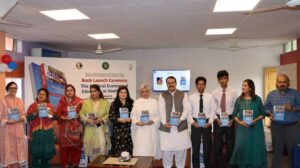Learning in emergencies
The need for interventions building on the value of resilience in emergencies has grown
If there is one word to describe people’s response to emergencies, climate change and multiple crises in Pakistan it is resilience.
Defined as the ability to withstand adversity and bounce back from difficult life events, it does not mean a person doesn’t experience stress, emotional upheaval and suffering; it involves the ability to work through emotional pain and suffering.
Resilience as a value and life skill attribute has cumulative reserves in households, workplaces and schools. Challenges in education and learning aggravate in prolonged crises. The number of children out of school (5-16 years) is now estimated at 28 million (up from 22.8 million), and the learning poverty is at 80 percent for all 10-year-olds unable to read a simple sentence in any language with understanding.
Since Covid-19, we have observed a societal readiness to access learning for living in any form and platform: digital, hybrid and face-to-face.
If resilience has grown in homes, schools and society, it is an attribute to recognise, respect and build upon for all.
Pakistan is ranked as the fifth country on the Global Climate Risk Index. The “monster floods on steroids” in 2022 not only impacted 33 million people living in proximity to flood-affected areas; they also destroyed homes and livelihoods but also damaged 32,000 schools, affecting 3.5 million students. Sindh was hardest hit with 60 percent schools affected. Stakeholders rallied to provide support at local, provincial, national and international levels amidst competing challenges of climate-induced emergencies, poverty, runaway inflation, slowdown of economic growth, low expenditures on education and political instability. By March 2023, 1.5 million people were still coping with standing water, and a million children had stayed away from schools.
Those in schools who had once again suffered absence due to floods were most at risk of prolonged learning losses; they needed urgent attention.
Emergency relief and recovery phases typically focus on goods/ inputs delivery (uniforms, health, hygiene, learning kits etc) along with mental health and psycho-social support and preparedness training; learning outcomes remain an outlier.
As stated by Freya Perry of the Foreign and Commonwealth Development Office, “The devastating floods in 2022 compounded years of education disruption due to the Covid-19 pandemic and worsened Pakistan’s pre-existing learning crisis. We know that when children are out of school for a few months, they don’t just fall those few months behind. Research shows that even years later, they are 1.5 academic years behind where they should be. That’s why when the floods hit, the FCDO prioritised foundational learning recovery to help children catch up.”
Cognizant of the risks of further escalation of learning poverty, Idara-i-Taleem-o-Aagahi, a civil society organisation, responded to the emergency, especially in Sindh, with a remedial catch-up programme of Teaching at the Right Level or Chalo Parho, Barho 60 days learning camps in Sindh.
Reaching out to 30,783 affected children (43 percent girls), of which 89 percent were at risk of dropping out from school and 11 percent out of school children (aged 6-13 years) with close collaboration of the Sindh Education and Literacy Department, 800 camps were set up in 391 government schools in Shikarpur and Ghotki districts. These inclusively targeted girls, children with disabilities and minority groups.
The content up to Grade 3 level was formally approved by the Directorate of Curriculum Assessment and Research under the SELD for a rapid rollout from January to September 2023.
The results from the 60-day catch-up learning camps highlight dramatic learning gains for both in-school and out-of-school children in Sindhi/ Urdu, arithmetic and English. With just one hour per subject interactive routines for 60 days, at the end-line, 47 percent could read a story in Sindhi compared to only three percent at the baseline. The basic arithmetic learning levels also indicated a steep improvement. At the end-line, 44 percent of children can do a two-digit division as compared to only threeper cent at the baseline. The aspirational English language highlighted even bigger gains. Sixty-three percent of children could read a sentence in English at the end-line as compared to only two percent at the baseline. 43 percent of the students were girls, 1 percent CWDs and 13 percent minority groups.
The rigour of measurement for evidence to scale up action cannot be understated in such initiatives. Hence children were assessed at baseline, midline and end-line with data instantly accessed through KoboToolbox for rapid results to inform iterative actions.
Local teachers from the community were trained intensively for five days with a minimum of matriculate and intermediate education and coaching support from cluster coordinators to ensure their academic, non-academic and assessment competencies of care.
The demand for such interventions building on the value of resilience in emergencies has grown. It must be a core package for emergencies. It is local, low cost and scalable.
The results prove that even in emergencies and with limited resources, children can learn.
The conversations and solutions on learning in emergencies are growing with acceptability of organised responses to the education crisis in complex times.
The Ministry of Educational Professional Training, together with all provincial counterparts, are committed to a range of actions for accelerated foundational learning for all children/ adolescents in Pakistan TARL/ CPB, The Citizens’ Foundation learning packages in emergencies, solutions by JICA/ NFE departments and summer camps etc, are growing with a Pakistan Foundational Learning Hub established by MoFE&PT for crowd-sourcing what works for learning.
Our children, teachers and society are ready to counter tough times in learning through outcomes-based caring solutions. They have managed to harness learning capital with progressive motivational and social capital accumulated over the years, called resilience, a mature response to stress and suffering. Along with school resumption in the ongoing recovery phase, there is an urgency to concurrently implement at-scale and low-cost, inclusive catch-up/ remedial learning solutions combined with social-emotional resilience and showcasing with bold public evidence.
Baela Raza Jamil is the CEO of Idara-i-Taleen-o-Agahi. She can be reached at Baela.jamil@itacec.org
Sehrish Farooq is the provincial coordinator for Sindh ITA. She can be reached at sehrish.farooq@itacec.org
Source: https://www.thenews.com.pk/tns/detail/1123688-learning-in-emergencies




